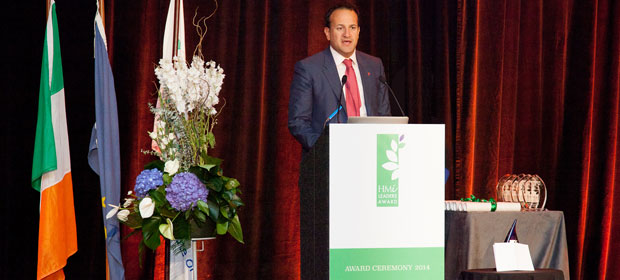The Irish health services will need strong leadership and management to ensure that when more resources become available they will result in better outcomes for patients, Health Minister, Dr. Leo Varadkar said when he presented the first HMI Leader Awards.

“The number of doctors and dentists employed by the HSE is at an all-time high, while the number of management and administrative staff is at an all time low and we should not be afraid to say that, when from time to time we hear the old mantra of “too many managers” rattled out.”
A total of 149 projects were entered for the awards, there were 26 shortlisted, seven finalists and nine received commendations.
Joint overall winners were Chatterbox by Elizabeth Downey and Carmel Feely, HSE, Cavan Monaghan and Cork Beats Stress by Jennifer Hayes, Department of Psychology, HSE, Cork.
The Minister said he would like to congratulate all those who were commended and won awards. “Thank you for the work you do across the health service and I would encourage you to keep up the good work in years to come,” he said.
HMI President, Mr. Derek Greene said the Institute was “blown away with the number of application and their quality. It shows what is good in the health services and the ingenuity and good work that goes on in the services,” he said.
The Minister said that the kind of reform and change he would like to see in the next couple of years was less revolutionary and more evolutionary change and less disruptive reform.
“The first reform is to get a realistic budget in place for next year which we can stick to. I am also very keen to do something to slow down the rise in the cost of health insurance which has caused so many people, especially young people, to drop their insurance, to reduce the cost of medicines and to do as much as we can to retain staff.
The number of management and administrative staff is at an all time low
“There are things we need to do to build up our management corps and provide more help for education. We are currently in discussions on free GP care for the under 6s and the over 70s and we can then move on to other groups, probably more children and eventually the whole population.”
The Minister said that on the hospital side, the key reform was the hospital groups. “I would welcome your support in this. Before we can have public and private hospitals competing, we need to ensure public hospitals are competitive and move towards money follows the patient.
“We have five major capital programmes underway – the move of Holles Street to St. Vincent’s, the Central Mental Hospital to Portrane, the new Children’s Hospital and the Primary Care Programme for roughly one primary care centre every month and community nursing units.
“We are developing new strategy around delayed discharges. If I do get any additional monies, I am keen to do something there. There are about 700 delayed discharges in hospitals this evening. I am also very keen to make a reality of the unique health identifier and I am very personally committed to the whole Healthy Ireland strategy.”
The Minister said that healthcare was not easy at a time of budget constraints, rising demands and increasing expectation.
“The spending freeze has occurred at a time when rising demand from an aging populating and rising costs due to new medicines and technologies.
“In the last couple of years the health service has responded very well to these challenges. The length of stay has gone down, although waiting lists and trolley counts have been deteriorating in the last couple of months, but they are still better than they were three years ago when there was more money available.
“As the economy improves over the next couple of years I think we can look forward to better budgets and improving services.”

